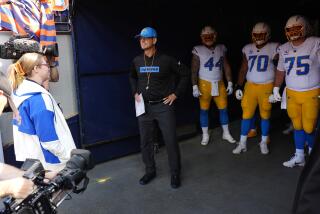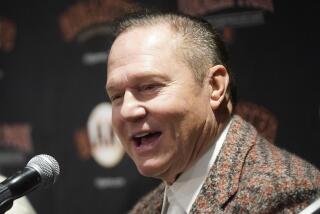Rangers a Tribute to Their Patient GM
- Share via
NEW YORK — When the practice succeeds, it is called patience. When it results in more defeats than victories, it is branded as indecision. At the moment, with one month remaining in Neil Smith’s first season operating a National Hockey League franchise, the Rangers stand as a tribute to a patient general manager.
Just as the club’s executive management took its time in selecting Smith as the man to succeed Phil Esposito and Smith made an exhaustive (and endless, by New York standards) search before hiring Roger Neilson as head coach, there has been no rush to change the character of the team that began the campaign. The Rangers who currently occupy first place in the Patrick Division are essentially the same Rangers that began the campaign on Oct. 6. That is no small consideration for fans and statisticians, who were bewildered by the constant change that characterized the Esposito regime.
It’s not, however, as if Smith hasn’t been tempted to overhaul the team. After an 8-1-3 start, the team went into a slump that would have tested the patience of Job, provided Job was familiar with the ramifications of icing. In plummeting from first place to last, the Rangers posted only one victory over a stretch of 16 games. For Smith, the low point occurred during a meeting of NHL general managers in Orlando, shortly after the start of the new year.
“This night we all went out to a nearby bar,” the rookie GM said in his Garden office before the Rangers’ 3-2 victory over the Capitals Wednesday night. “It was a sports bar, one that had a screen the size of that wall. Guess what game everyone was watching? It was Pittsburgh vs. the Rangers and the score was something like 5-2 in favor of the Penguins when we walked in.
“Through the static, you could hear the booing in the background. I was trying not to look (at the screen) and the other guys (GMs) were looking at me. I’ll never forget that.”
During the same trip, the man received so many inquiries from reporters regarding possible changes in the club that a conference call was set up. In the course of the conversation, there was a knock on the door. He excused himself and, when he returned to the phone, noted that it was the maid. She wanted to trade a towel, he reported, for three washcloths.
A sense of humor had been one of Smith’s most valuable assets in coping with the adversity that precipitated considerable pressure from the New York media and the fans they serviced. He claims he gave himself the nickname of “No-Deal Neil” in contrast to the policies of his predecessor, who was known as Trader Phil. Even now, he likes the sound of it.
Of course, he eventually did make a major deal, acquiring high-scoring center Bernie Nicholls from the Kings in exchange for wings Tomas Sandstrom and Tony Granato. But that was during the all-star break, after the Rangers had begun to right themselves with a four-game unbeaten streak. “There was a time,” Smith said, “when I didn’t think we would do anything. And that didn’t scare me.
“When the Nicholls deal came along, we were starting to come out of it. It just happened that he was exactly what we needed, not just in the short run but in the long run. He gave us a big center and he gave us offense without disturbing our strength on defense.”
Remarkably, the trade was only Smith’s second of the season, third if you count the purge of unhappy defenseman Michel Petit on the night before the first game. Esposito made eight trades during the 1988-89 season, which was a low number for him. The average number of players to wear a Ranger uniform in Espo’s three seasons was 45. Thirty-two players have seen action for these Rangers.
“There are two keys to that,” he said. “The first is working with Roger. He’s unbelievably patient for a coach. Secondly, during that slump, (MSG executives) Jack Diller and Dick Evans didn’t put any pressure on me to make a move, to do something to make the people happy. I think they truly believe in the program. When you add those two things together, you have the best of both worlds, an understanding ownership and a patient coach. Plus, I’m a patient person by nature.”
That’s understandable, considering Smith was a player whose talents were not in great demand by NHL clubs when he came out of Western Michigan University. The Islanders drafted him, but not until the 12th round, and he never made it out of the International Hockey League. After retiring as a player, he asked the Islanders for a job. That resulted in some part-time scouting assignments. Finally, his diligence earned him a fulltime position and when farm director Jimmy Devellano left to become GM of the Red Wings, he took Smith with him.
He learned the business from the ground up. And when it came time for him to hire his first coach, he recalled the letter he once sent to Neilson seeking a position as instructor at the man’s hockey school in Toronto. “My mother saved it,” he said. “I think I’ve got it around here somewhere.” And, after fishing through his papers, he produced the document and Neilson’s response.
The latter was terse--two sentences, to be exact. What it said is that there were no positions available. “He didn’t even sign it,” he said, pointing to the secretary’s initials alongside the signature. Eleven years later, the 35-year-old Smith found himself sitting across the table from the 55-year-old coach, offering him a job.
He was amused by the irony. It was that attitude that left him unfazed (although not unconcerned) by the testing slump. He recalls thinking to himself, on the various anniversaries of his hiring, “I made it through a month, I made it through two months,” and no one had discovered that he couldn’t do the job. Therefore, he must not be a fraud.
Well, now he is in his eighth month and the Rangers are in first place and the stability he brought to the Garden can rightly be called patience. At least until the Stanley Cup playoffs, which are a separate story entirely.
More to Read
Go beyond the scoreboard
Get the latest on L.A.'s teams in the daily Sports Report newsletter.
You may occasionally receive promotional content from the Los Angeles Times.






